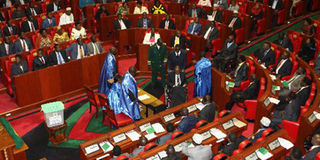Invest your trust in Cabinet that is independent of Parliament

The National Assembly. PHOTO | STEPHEN MUDIARI | NATION MEDIA GROUP
What you need to know:
- Members of Parliament (MPs) shamelessly raid the public purse to feather their nests while in service and to secure blissful retirement.
- The National Assembly has 349 MPs, but all too often 50 cannot be found to constitute a quorum for parliamentary business to begin or continue.
- Not surprisingly, the selfsame legislators want this minimum to be reduced.
Beware. The outgoing 11th Parliament would like its successor to initiate constitutional changes that would allow the President to pick Cabinet nominees from MPs. That says legislators are unhappy with the current dispensation where Cabinet Secretaries are picked from outside Parliament and when an MP is appointed CS, relinquishes his or her elective position.
This means Parliament favours a return to the pre-2010 constitutional order where ministers exercised and wielded both legislative and executive power from the front benches and beyond. Then, ministers belonged to an exclusivist club that was both feared and coveted for its privileged position of proximity to ultimate power – the Presidency.
Parliament is, therefore, asking Kenyans to re-introduce the politics of patronage and power of presidential benefaction where the Head of State rewards and retains loyalty by appointing supporters to the Cabinet. In this scheme of things, patronage is also an entitlement the President uses or dangles to ease or erase intra-party tensions and conflicts.
Is Parliament suggesting ministers sourced from among MPs would perform better than the current CSs recruited from the private and public sectors, academia and politicians? Suffice to say it is politically judicious to pick ministers from a wide pool of talents, experience and achievers than to restrict the President and Cabinet to political gaggle.
Kenyans should benefit from wide professional expertise brought together to work under what former British Premier Gordon Brown would call Goats – Government of all the talents. Mr Brown turned to the variety of genius in the unelected House of Lords and not the Commons, which is packed exclusively with politicians, for his Goats.
AWARD-WINNING EXECUTIVES
With devolution and globalisation, the President should be spoilt for choice when looking for CSs. Counties have Cabinet ministers; Kenya boasts local and foreign-based award-winning executives, international civil servants and entrepreneurs. Forget resumes! Their achievements can be vouched for by peers, juniors and seniors.
Do MPs want extra work? An MP works for, and is accountable to, his constituents, Parliament and political party. A minister who is an MP will work for the foregoing three plus the Executive (Ministry). And, remember, MPs have private businesses and families that demand their attention.
For a serious MP, dealing with the needs of constituents or their correspondence alone is full time back-breaking work. Therefore, what MPs want is not work but power in-house, proximity to power, avenue for promotion and prestige for the House. They feel power lies with CSs who are removed from them and who consider them an agitating nuisance.
MPs cannot claim that the reason they seek to have CSs in the House is for ease of oversight. About 65 to 70 per cent of the work of Parliament is carried out through House committees. These, if properly constituted and moderated, backed by technical expertise, and benefitting from adequate research, should expertly execute the oversight role.
'UNDUE DEMANDS'
But, as I wrote here on June 14, 2014, CSs, principal secretaries and parastatal chiefs appearing before parliamentary committees “have complained about undue demands, harassment and intimidation in the periods leading to and during meetings. They have also expressed doubts about MPs’ capacity, competence or seriousness to understand technical issues or their oversight role”. While CSs may hold MPs in low esteem, they do not fight them. Indeed, most keep out of sight and, therefore, out of public mind, save for the constantly under pressure Fred Matiang’i (Education), James Macharia (Infrastructure) and Cleopa Mailu (Health); and political apparatchiks Mwangi Kiunjuri (Devolution) and Eugene Wamalwa (Water).
Previously a minister played president for having his eye and ear and wield power. Not so the CS. The past minister was conflicted, serving as lawmaker and defender of the law-flouting Executive. Not so the CS, whose sole remit is to execute the Executive’s mandate. The minister of yesteryear was a commissar. Not so the politics-eschewing CS.
How have MPs changed? Not a jot! They shamelessly raid the public purse to feather their nests while in service and to secure blissful retirement. The National Assembly has 349 MPs, but all too often 50 cannot be found to constitute a quorum for parliamentary business to begin or continue. Not surprisingly, the selfsame MPs want this minimum to be reduced.
Previously, minister-MPs could not attend Parliament because they were busy with matters of State. Now non-minister MPs who cannot attend Parliament because they are busy with non-State matters want executive functions. Invest your trust in a Cabinet that is independent of Parliament.





